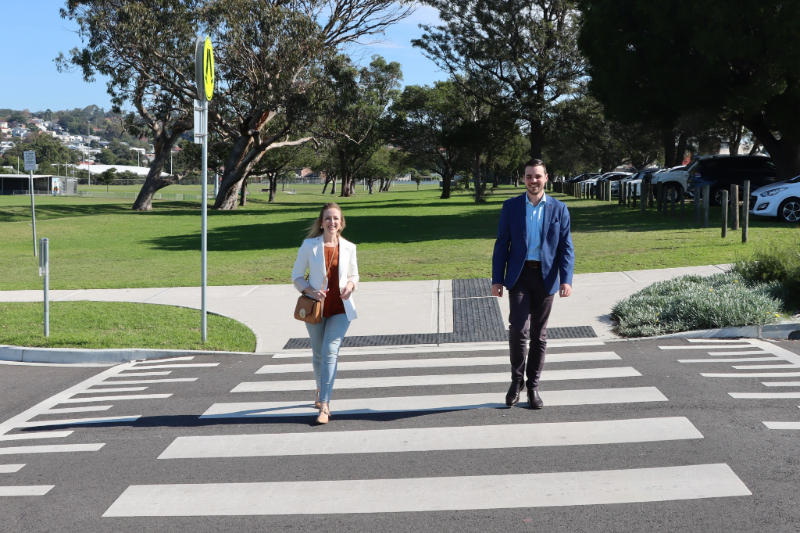The NSW Government is today officially opening the $723.3 million Tweed Valley Hospital, a state-of-the-art health facility on the NSW North Coast that will also be supported by a new urgent care service in the area and a brand new ambulance station in Kingscliff.
This investment will provide a significant boost to healthcare on the North Coast of NSW, a rapidly growing region that deserves the best access to world class healthcare.
Tweed Valley Hospital
The new Tweed Valley Hospital represents the largest capital health investment in the regions in NSW history, including capacity for 430 beds, almost 200 more beds than at the former hospital.
Key features of the hospital include:
- Access to radiotherapy services, as part of a new integrated cancer care service.
- New satellite medical imaging in the emergency department, to speed up access to support.
- An interventional cardiology service that is currently being developed, delivering diagnostic and interventional cardiology procedures for the first time in Tweed.
- A clinical training and research hub through the Northern NSW Academic Health Alliance that brings together local universities, TAFE NSW and the Local Health district.
- And a new car park will provide over 1000 free car parking spaces at the hospital campus.
Tweed Urgent Care Service
Further to the opening of the new hospital, residents in the Tweed will now also have access to an urgent care service in Tweed that eases pressure on emergency departments by providing care to people in their homes.
The new service, launched only weeks ago, is initially treating elderly patients in the comfort of their home or residential aged care facility.
Next month the service will expand to operating 7 days a week from 8am to 8pm, to support people of all ages across the Tweed region to receive urgent care at home.
The service will be staffed by a team of nurses, NSW Ambulance Extended Care Paramedics and allied health professionals.
Kingscliff Ambulance Station
Ambulance services in the region are also being boosted with construction of Kingscliff’s new ambulance station, on track for completion in the coming months.
The new 2-level ambulance station will replace a 65-year-old station on Marine Parade in Kingscliff.
It will feature 8 internal parking bays (including an internal wash bay), administration and office areas, staff rest facilities, gym, logistics and storage areas and on-site parking.
These new health facilities and services are further supported by the NSW Government’s commitment to rebuilding essential services by addressing the staffing crisis inherited from the former government.
From lifting the wages cap, working to deliver 500 new paramedics in rural and regional NSW and implementing safe staffing levels while delivering paramedics a historic pay rise, the NSW Government is supporting the staff these new hospitals, ambulance stations and services need.
Premier Chris Minns said:
“Whether you live in the middle of the city or in regional communities like the North Coast, we’re working hard to make sure everyone has access to the very best health care.
“This new hospital as well as a new urgent care service and ambulance station are going to make a huge difference to this rapidly growing region in NSW.
“We are not only committed to delivering the very best health facilities but also to looking after the staff in them who look after all of us.”
Minister for Regional Health Ryan Park said:
“This $723.3 million hospital is the one of the largest hospital investments in NSW history.
“For the community here in Tweed, this facility means hundreds more hospital beds, more ED treatment spaces, and more single patient rooms.
“New services at the hospital are estimated to benefit 5000 patients each year by giving them access to care locally, without needing to travel outside the region as was previously the case.
“We’re also pleased the Urgent Care Service is up and running, enabling residents to receive high quality, expert care without leaving their home, providing a better patient experience and easing pressure on the region’s busy emergency departments.”
Member for Lismore Janelle Saffin said:
“I am proud to be part of a government which is committed to investing in rural and regional health infrastructure to support better health outcomes for local communities.
“This new hospital, the establishment of an urgent care service and a new ambulance station at Kingscliff will provide benefits for Tweed and beyond.”
Labor Spokesperson for the Tweed Emily Suvaal MLC said:
“I thank our incredible health staff, leaders and managers who have been integral to this project, ensuring the successful delivery of this fantastic health facility for the community.
“As a former nurse, it is great to know this beautiful new hospital was designed in partnership with clinicians, staff and the community to deliver the best clinical outcomes for patients.
“It’s also great the campus will be home to the Northern NSW Academic Health Alliance, which will build a pipeline of skilled healthcare workers for the Northern Rivers.”

 Cr Adamczyk and Deputy Lord Mayor Declan Clausen use the pedestrian crossing at New LambtonDeputy Lord Mayor Declan Clausen said encouraging more people to walk is important for the wellbeing of our community and the liveability of our city.
Cr Adamczyk and Deputy Lord Mayor Declan Clausen use the pedestrian crossing at New LambtonDeputy Lord Mayor Declan Clausen said encouraging more people to walk is important for the wellbeing of our community and the liveability of our city.